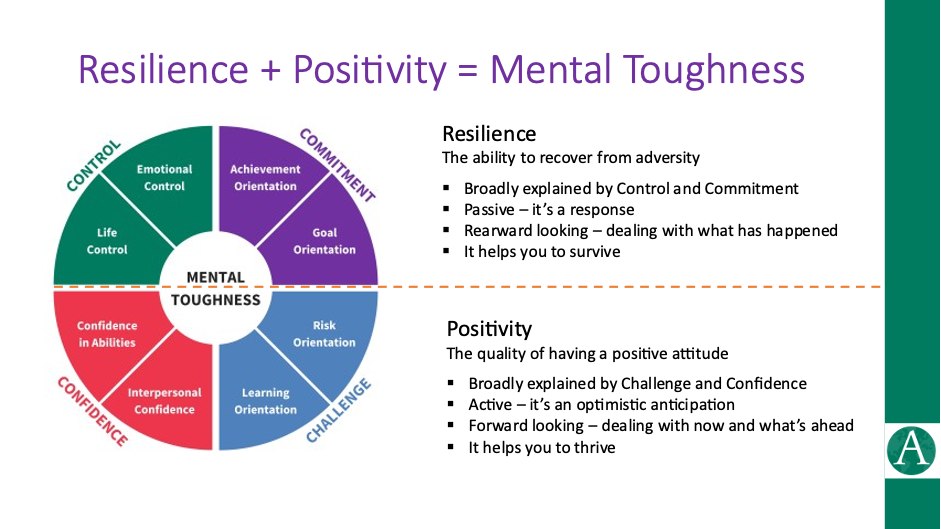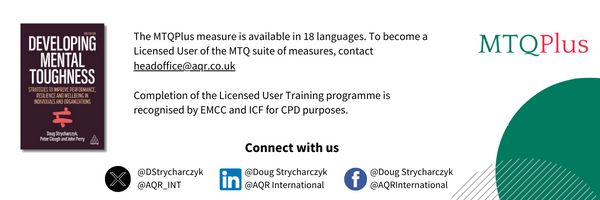Resilience and Positivity or Optimism come together in the Mental Toughness concept.
The terms Resilience and Mental Toughness are often confused which means that desired outcomes such as thriving can be targeted but not achieved.
There is a difference, and it is important. Resilience is desirable and useful. It is not enough on its own.
Resilience is defined as “the ability to recover from adversity”*.
This describes an ability to recover from an adverse situation either largely or completely. It does not mean that the person has a positive feeling about the negative situation. It simply means – “something has gone awry, but I am going to grit my teeth, pick myself up and I still believe that I can do some or all of what I originally intended – despite this setback – and I am going to do my best to achieve some or all of my goals”.
We would commonly describe someone who does this as a resilient individual and an organisation as a resilient organisation. It is about being able to “bounce back”.
It helps organisations and people to survive. It is also backward-looking. The adverse event has happened, and the focus is often on restoring what was there before. It is also almost always passive – “I did not plan to do this, but I have had to deal with it”.
As we can see below the mental toughness concept helps to put this into perspective. This is a very well-evidenced fundamental aspect of personality which describes the totality of our individual mental responses to events. It’s where resilience and positivity come together.

We now know that mental toughness consists of 8 independent factors, around four themes, sometimes called the 4Cs, each contributing to our overall level of mental toughness.
The considerable body of research shows that mental toughness is a very significant factor in:
- Performance – 25+% of difference can be explained by differences in mental toughness.
- Wellbeing – the more mentally tough deal better with anxiety, stress and depression
- Agility – the ability to deal with change and challenge and the speed at which it happens.
- Aspirations – seeking growth, finding solutions and flourishing.
The four factors at the top of the “pizza” image broadly describe the components of resilience -“With this mindset, I can bounce back”. The four factors at the bottom explain positivity or optimism. This is defined as “the quality of having a positive attitude”*.
Optimism is about dealing with the present and the future. Accepting uncertainty, positivity describes the mental ability to see the threats and the opportunities and being optimistic about being able to seize opportunities and grow. Without this, it is a struggle to succeed.
People and organisations who are resilient without optimism and confidence may be resilient but are likely to still find the going gets tough. Without something else coming into play (a positive mindset) overexposure to setbacks and adversity can, and do, wear down individuals and organisations.
The resilience and optimism of an organisation is also an aggregation of the resilience and optimism of its people. None more so than those at the top of the organisation whose levels of mental toughness will significantly influence its culture.
Can we assess mental toughness – resilience and positivity?
We can. The research behind the concept created a high-quality psychometric measure, MTQPlus, which can assess levels of mental toughness across the 8 factors. Enabling differences between people and within organisations to be diagnosed with confidence. It is essential for development.
Can we develop this?
We can. Resilience, positivity and mental toughness can be developed through targeted experiential learning – through coaching and workshops. Again, research shows that self-awareness about one’s mental toughness is key for true engagement in development and for customisation of learning. One size fits all doesn’t work here.**
Mental Toughness is defined as “a personality trait which determines in large part how individuals respond mentally to stress, pressure, opportunity and challenge irrespective of circumstances”. Mentally tough individuals see challenges and adversity as opportunities and not a threat with confidence and a positive approach to take what comes in their stride.
We might usefully think of this in terms of the phrase “survive and thrive”. Resilience helps you to survive (but not always). Adding Positivity to yield Mental Toughness helps you to thrive (but, again, not always).
The mental toughness concept and measure bring leading edge and practical support to leaders determined to do more than survive.

*Cambridge Dictionary


